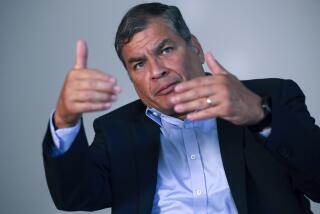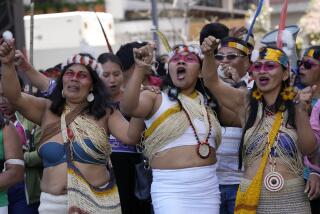ECUADOR
- Share via
QUITO, Ecuador — Latin Americans who yearn for days gone by would probably be cured by a visit to Ecuador, where the kinds of protectionist policies that its neighbors jettisoned long ago are still in force.
What does Ecuador have to show for it? The worst economic crisis in 30 years, a banking system in a shambles and the highest inflation in the region. Its sobriquet--Latin America’s economic basket case--seems right on the money for a nation facing overwhelming debts and deficits.
One analyst calls it “historic craziness.”
To be sure, several recent calamities helped push Ecuador to the abyss. Heavy El Nino rains ravaged crops and wiped out roads and bridges, and last year’s plunge in oil prices cost the country precious revenue. Until an October peace accord, Ecuador had been enmeshed in a costly decades-long border dispute with Peru.
But Ecuador’s heaviest millstone could be an economic system 20 years behind the times. The country is still stuck with bloated state-run telephone, petroleum and electricity monopolies of the kind that other countries have sold off. Unionized government employees are so grossly overpaid that many people blame them for the ballooning budget deficit.
New President Faces an Uphill Battle
The world’s largest banana exporter and rich in oil, Ecuador (population: 12.1 million) has economic potential. But the utter lack of world confidence in the country’s ability to achieve it was apparent last year when two efforts at privatizing the state-owned telephone utility, Emetel, failed because of evidence the auctions were rigged.
Ecuador is not only failing to attract new foreign investors, but those who were already there are heading for the exits, disillusioned by the country’s corruption and unpredictable legal system.
Now the region’s sickest economy is finally signing up for free-market therapy, hoping to find a cure in the competition and foreign investment it previously spurned.
Ecuador’s new, Harvard-educated, president, Jamil Mahuad, taking office after a decade of scandal and stagnation, is hoping that open, free markets are the elixir for what ails his country.
The top aides and ministers Mahuad has brought aboard are young, foreign-trained economists reminiscent of the technocrats who carried out market-based reforms in Mexico in the late 1980s and Brazil in the 1990s.
“We know we have been late in performing some of the structural reforms, but we feel we can avoid mistakes some other countries have made,” said Jose Carrera Espinosa, Ecuador’s undersecretary of finance, who got his Ph.D in economics at Notre Dame.
But Mahuad and his team face an uphill battle. Market reforms proposed by Ecuador’s two previous chief executives, Abdala Bucaram and Fabian Alarcon, were rebuffed by Ecuador’s highly fragmented congress. It didn’t help that Bucaram was driven from office and that Alarcon, his successor, was a lame duck.
“Development in Ecuador is a political problem, not so much a technical or economic problem. Ecuadoreans have been unable to pull together a governing majority that can translate policy into effective action,” said John Sanbrailo, a retired U.S. official who is now a consultant to the Ecuadorean government.
Siobhan Manning, a PaineWebber specialist on Latin American debt, said Ecuador’s constitution gives little power to the president and makes him subject to the will of the legislature, whose populist majority until now has resisted efforts to raise taxes and impose fiscal discipline.
Debt Skyrockets as Revenues Plunge
The resistance was harder to overcome at a time when Ecuador was managing to avert the economic disasters its neighbors were suffering.
The hyper-inflation that brought Peru, Argentina and Brazil to their knees over the last decade did not touch Ecuador, whose lucrative dollar-based oil exports gave it a measure of immunity.
But things have worsened dramatically in the last few years. The country is now choking on debt that amounts to 72% of annual economic output. The shortfall in oil revenues is part of the reason, as is the fact that Alarcon took out big foreign loans during his brief tenure to meet the bloated government payroll. Interest on its debt now accounts for 43% of Ecuador’s annual budget.
Ecuador’s annual inflation is running at 43%, and the currency lost more than half its value against the dollar last year. Because of depressed oil prices and fiscal ineptitude, the nation’s current account deficit--the broadest measure of trade--reached a horrific 10% of economic output in 1998, more than three times a prudent level.
“It’s reached historic craziness,” said Maria de la Paz Vela, an analyst with Multiplica, an economics research and consulting firm based in Quito. “The government is under so much pressure, domestic and foreign, that [Mahuad] has very little room to maneuver. It’s a situation of constantly putting out fires.”
Envisioning a ‘New Beginning’
Mahuad plans to privatize state-owned companies to raise $2 billion by the end of 2000. Given the Emetel fiascoes, that could be an optimistic goal. But optimism is incongruously abundant around government offices here.
“There is a new beginning, a new image of the country,” said Alvaro Guerrero, head of Conam, the federal agency charged with privatizing government-owned companies and attracting foreign capital.
“Many countries had bad governments at the beginning of this process, and we are working in a professional and responsible way to improve the situation,” he said.
But more than new laws and faces are necessary.
The depth of corruption was colorfully illustrated when the son of then-President Bucaram threw a public party in Guayaquil to celebrate his first $1 million in customs bribes, shortly before his father was forced from office in early 1997.
Corruption has become so bold and so pervasive that Mahuad has made public appeals to the World Bank and to the social-policy think tank founded by former President Jimmy Carter for help in combating it.
The country also needs to clean up its reputation as a deadbeat. The government owes about $100 million for petroleum services provided to its state-owned oil company. It also owes teachers, doctors and other public employees back pay, Multiplica’s Vela said.
Bank of America, oil services firm Halliburton and pharmaceutical giant Pfizer are just a few of the U.S. companies that pulled out or scaled back in the 1990s after running up against one problem or another in Ecuador.
“What Ecuadoreans don’t realize is there is global competition for capital and that companies are concerned whether it’s worth it to put up with the problems here. Ecuador’s not the gateway to anything,” one foreign official said.
In fact, in recent years Ecuador’s business climate had become so hostile that the U.S. government was openly dissuading American companies from investing here. Now embassy officials here say they are withholding judgment as Mahuad tries to turn things around.
“This time they could be serious. The new government has largely world-educated people who realize that Ecuador is not an island,” the foreign official said.
Taking Serious Steps to Address Problems
A sign of that seriousness is the $1.8-billion economic stimulus and bank rescue measure Mahuad got through the congress in November. He also ramrodded through a 1% tax on all financial transactions, a tariff that also replaces Ecuador’s income tax. It resembles taxes already in place in Brazil and Colombia and is effective in raising revenues quickly.
The next major initiative as Ecuador’s congress reconvenes this week will be privatization of the state-owned oil company. The aim is to authorize private investment in oil exploration, sell off various assets and finance a $500-million pipeline that could lead to a doubling of Ecuador’s oil exports. Atlantic Richfield of Los Angeles is one of the oil companies interested in building it.
Oil privatization, it is hoped, will bring billions of dollars of investment to Ecuador’s oil fields. But more than that, investment could bring about important institutional benefits as well, said Raul Gangotena, former Conam chief who presided over the failed phone company auctions and resigned in protest over the government’s handling of them.
“The entry of large, respectable companies will break up the control by the few and help institutionalize democracy in the country,” Gangotena said.
(BEGIN TEXT OF INFOBOX / INFOGRAPHIC)
Ecuador”s Failure
Deeping debt and stagnant growth and wages have finally brought Ecuador’s leaders around to the idea that free-market reforms are the way out of the deepest economic hole on the continent. Wage Growth
Annual real wage growth manufacturing jobs, inpercentage::
1997: -3.9%
*
Inflation
Annual inflation, in percent:
1997: 31%
*
Per-Capita GDP
Per-capita gross domestic product in 1990 dollars:
1997: $1,392 *
Economic Growth
Average annual EDP growth rates in percent:
1970-80: 6.3%
1980-90: -0.6%
1990-97: 1.5%
* Source: Inter-American Development Bank
More to Read
Sign up for Essential California
The most important California stories and recommendations in your inbox every morning.
You may occasionally receive promotional content from the Los Angeles Times.










